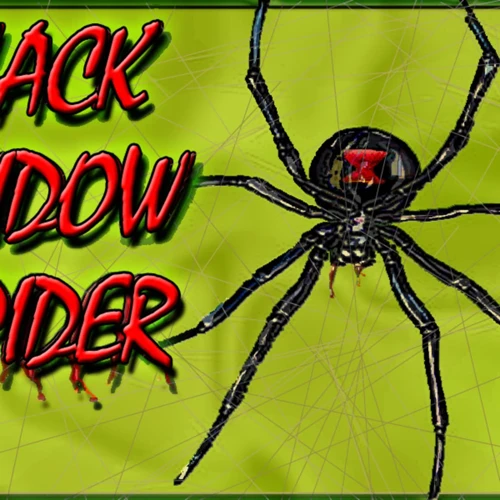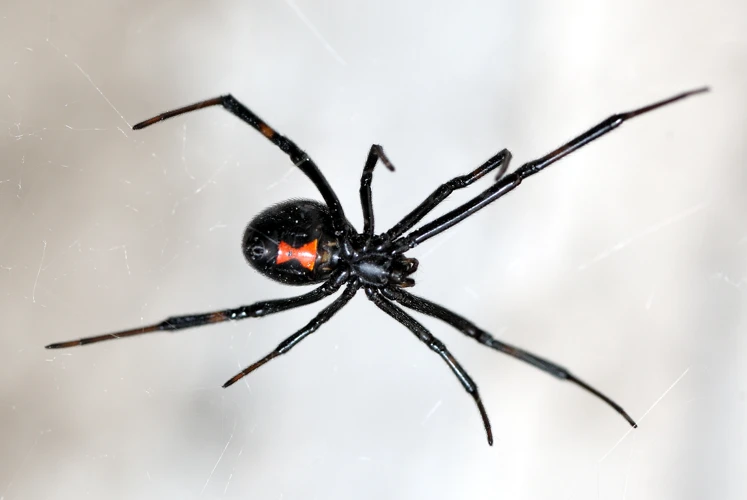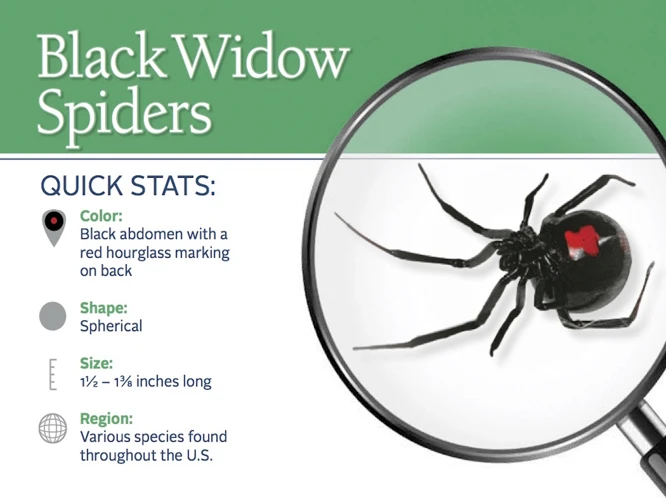As you head into your storage area to clear out those old appliances and debris, the last thing on your mind might be the possibility of a black widow spider lurking in the shadows. Unfortunately, these venomous spiders are quite common in cluttered and unkempt areas, so it’s important to take the necessary precautions to avoid a potentially dangerous encounter. In this article, we’ll walk you through the steps for safely removing large debris and appliances to avoid black widow spider bites and offer a few additional tips to help you steer clear of these unwanted visitors.
Why is it Important to Remove Large Debris and Appliances Safely?

Removing large debris and appliances safely is crucial to prevent the possible presence of black widow spiders. Black widow spiders are venomous arachnids that can cause serious health issues to humans. Hence, it is vital to remove the clutter and debris from your surroundings to avoid contact with these dangerous creatures. Neglecting the removal of clutter can lead to an unwanted habitat for black widow spiders and increase the risk of spider bites. In the following sections, we will discuss the significance of safe debris removal in avoiding black widow spider bites and some tips to achieve a clutter-free space. You can also check out our article on the benefits of storage bins for black widow spider prevention for further information.
What are Black Widow Spiders?
Black Widow Spiders (Latrodectus mactans) are infamous for their venomous bite and the red hourglass marking on their back. They are medium-sized spiders ranging from 3 to 10 millimeters long, and females are larger than males. These spiders are found throughout North and South America, and they prefer to live in warm, dark, and dry environments like under rocks, piles of debris, and unused outdoor appliances. Black Widow Spiders use their venom to immobilize their prey, such as insects and other small animals. The venom contains a neurotoxin that affects the nervous system and can cause muscle spasms and respiratory problems.
It’s important to understand that Black Widow Spiders are not aggressive and will typically only bite when threatened or disturbed. However, the bite from a Black Widow Spider can be serious and even life-threatening if not treated promptly. The severity of the bite depends on the amount of venom injected, the location of the bite, and the person’s sensitivity to the venom.
According to the National Poison Control Center, approximately 2,400 people are bitten by Black Widow Spiders each year in the United States. It’s essential to take precautions to prevent these spiders from infesting our living spaces and to know how to safely remove any debris or appliances from areas where these spiders dwell.
To keep your home free from Black Widow Spiders, consider storing items in plastic storage bins with lids or in clutter-free areas that are frequently cleaned. Also, be sure to inspect your home and outdoor spaces regularly to look for signs of infestation, such as spider webs and egg sacs. A professional cleaning can also be helpful in preventing these spiders from entering your home. By taking these precautions, you can keep your home safe from Black Widow Spiders.
Click here for more information on the dangers of neglecting clutter removal and black widow control.
What Happens if You Get Bitten by a Black Widow Spider?
Black widow spider bites are dangerous and can cause serious health problems. After being bitten, you may not feel the pain right away, but the symptoms will start to appear within a few hours. Here are the possible effects of being bitten by a black widow spider:
- Initial pain and redness at the site of the bite: When a black widow spider bites, it usually injects venom into the skin. The area around the bite will quickly become red and painful.
- Muscle cramps and spasms: After a few hours, the venom will start to affect your muscles. You may experience muscle cramps and spasms that can be extremely painful. The muscles in your abdomen, back, and legs are most commonly affected.
- Abdominal pain and muscle rigidity: As the venom spreads throughout your body, you may also experience abdominal pain and muscle rigidity. You may feel like you have a tight band around your chest or abdomen.
- Sweating and chills: You may start to sweat profusely and feel cold and clammy, as if you have chills or a fever.
- Nausea and vomiting: In some cases, you may also experience nausea and vomiting after being bitten by a black widow spider.
- High blood pressure and rapid heartbeat: The venom of a black widow spider can also affect your cardiovascular system, causing high blood pressure and a rapid heartbeat.
It is important to seek medical attention immediately if you have been bitten by a black widow spider. Your doctor may recommend anti-venom medication or other treatments to help relieve your symptoms. To prevent being bitten in the first place, it is essential to follow safety guidelines and remove large debris and appliances from your home, garage, and yard where these spiders can hide. Following the tips in this article can help you avoid black widow spider bites and stay safe.
If you want to learn more about the benefits of storage bins for black widow spider prevention, click here.
How to Safely Remove Large Debris and Appliances to Avoid Black Widow Spider Bites

Removing large debris and appliances safely is crucial to avoid coming into contact with black widow spiders. Here are some steps to take:
Step 1: Wear Protective Clothing
Before removing any large debris or appliances, make sure to wear protective clothing, such as long sleeves, pants, gloves, and boots, to avoid any direct contact with the spider.
Step 2: Inspect the Area
Thoroughly inspect the area before beginning to remove any debris or appliances. Use a flashlight to look for black widow spiders or their webs.
Step 3: Use Caution When Moving Debris
When moving any large debris, use caution and avoid dragging it along the ground, as this can disturb any black widow spiders hiding underneath. Lift the debris carefully and move it to a designated area away from your living space.
Step 4: Properly Dispose of Debris
Once the debris has been cleared, dispose of it properly. Seal it in heavy-duty trash bags and dispose of it in a designated area, away from your living quarters.
Step 5: Clean the Area
After removing debris or appliances, make sure to thoroughly clean the area. Use a vacuum or broom to clean up any loose debris or spider webs.
It is important to note that prevention is key when it comes to avoiding black widow spider bites. Keep your living space clutter-free and remove any potential hiding spots for spiders. Regularly inspect outdoor items such as firewood and leaf litter, and keep a clutter-free workspace.
For more information on preventing black widow spiders, check out our article on the importance of removing clutter and debris for black widow spider prevention.
Additional Tips to Avoid Black Widow Spiders
Additional Tips to Avoid Black Widow Spiders
1. Teach Children to Keep Clutter at Bay: Children often leave their toys lying around the house, which can create clutter. Cluttered areas provide a perfect hiding spot for black widow spiders. Teach your children to keep their rooms and play areas tidy.
2. Remove Clutter and Debris from Your Home: Black widow spiders thrive in dark and cluttered areas. Regular cleaning and removing debris can help prevent them from making their home in your house.
3. Store Firewood and Leaf Litter Away from Your Home: Black widow spiders love to make their nests in piles of firewood and leaf litter. To keep them away from your home, make sure to store these items away from your living area.
4. Keep Your Work Space Clutter-Free: If you have a workshop or storage area, keep it free from clutter and debris. This will not only prevent black widow spiders from nesting there, but it will also make it easier to find what you need.
5. Remove Outdoor Debris: To keep black widow spiders away from your home, it’s important to remove any debris that may be lying around your yard. This includes piles of leaves, sticks, and other natural debris.
6. Schedule Regular Home Inspections: A professional home inspection can identify areas of your home where black widow spiders may be hiding. These inspections can catch issues early, and prevent these spiders from becoming a problem.
7. Hire a Professional Cleaning Service: If you are concerned about a black widow spider infestation in your home, consider hiring a professional cleaning service. They will have the tools and knowledge to safely remove any spiders from your home, and can help prevent future infestations.
Conclusion
In conclusion, it is crucial to take the proper steps to remove large debris and appliances safely in order to prevent black widow spider bites. These venomous spiders are not to be taken lightly, as their bites can cause serious health problems and even death in some cases. By following the steps outlined in this article, you can significantly reduce your risk of encountering and being bitten by a black widow spider.
Remember to always wear protective clothing and gloves when handling debris and appliances, especially in areas where black widow spiders are commonly found. Make sure to inspect the areas thoroughly before starting any removal process and use caution when moving heavy objects.
In addition to safe removal methods, it is also important to take preventative measures to avoid black widow spiders altogether. Seal any cracks or crevices in your home to prevent them from entering, keep clutter to a minimum, and remove any spider webs you come across.
By taking these precautions, you can enjoy a safe and spider-free environment. Don’t let the fear of seeing a black widow spider keep you from completing necessary cleanup tasks. With proper preparation and knowledge, you can get the job done while staying safe and bite-free.
Frequently Asked Questions
What items are considered large debris and appliances?
Large debris can include things like discarded furniture, old appliances, or construction materials. Appliances can include refrigerators, washers, or dryers.
How do you know if there are black widow spiders in the area?
You can look for black widow webs in dark areas like garages and sheds. You may also see the spiders themselves, which have a distinctive black body and red hourglass shape on their abdomen.
What time of day are black widow spiders most active?
Black widow spiders are nocturnal, meaning they are most active at night.
What is the best way to prevent black widow spider bites?
Avoid areas where black widows are known to live and wear gloves and protective clothing when moving large items.
Should I try to treat a black widow spider bite at home?
No, seeking medical attention immediately is the best course of action in case of a black widow spider bite. Antivenom is available for treatment.
Is a black widow spider bite always dangerous?
While black widow spider bites can be dangerous, not all bites are life-threatening. However, seeking medical attention is still necessary as symptoms can still be severe.
What are some symptoms of a black widow spider bite?
Symptoms of a black widow spider bite can include severe pain, muscle cramps, nausea, and sweating.
How long do the effects of a black widow spider bite usually last?
The effects of a black widow spider bite can last anywhere from a few hours to a few days. In severe cases, symptoms can persist for several weeks.
Do black widow spiders only live in certain parts of the world?
Black widow spiders are found all over the world, but are most commonly found in warm climates like the southern United States.
Can black widow spiders be found indoors?
Yes, black widow spiders can be found in dark places indoors like garages, attics, and basements.






